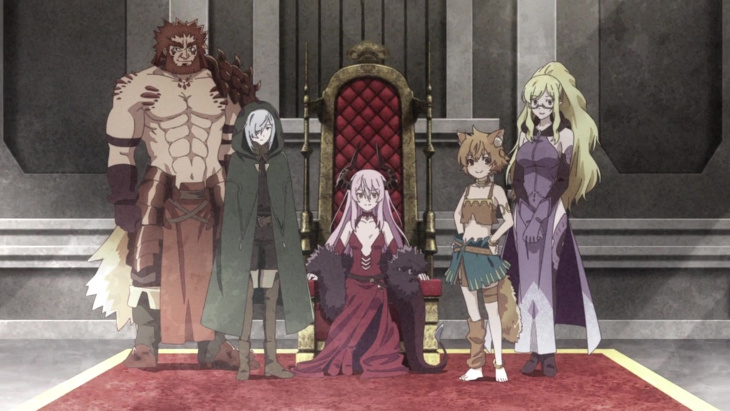
“Let me tell you what the world was like when I was born. It was a long, long time ago…”
In recent anime seasons, I’ve endeavored to follow at least one or two shows that didn’t have good premieres, but had exhibited a degree of potential. I’m Quitting Heroing is one such show, where I didn’t glean that much enjoyment from its first episode, but there were hints that it may have a few novel ideas up its sleeve. While it takes a while for those traces of intrigue to pay off, the show eventually capitalizes upon them, resulting in some pleasant surprises. Unfortunately, this isn’t enough to warrant a recommendation. The show is, when viewed as a whole, a pleasant enough watch, but the rare occasions where it breaks the mold aren’t sufficient to invest the time needed to get to them, and the show is weighed down by bog-standard animation, weak comedy and tired clichés. Part of me wants to be nicer to the series because it exceeded my expectations, but despite some cute subversions of fantasy tropes, I’m Quitting Heroing remains painfully generic, and even with a few cute twists and turns in the narrative, it struggles to fill a full twelve episodes with content.
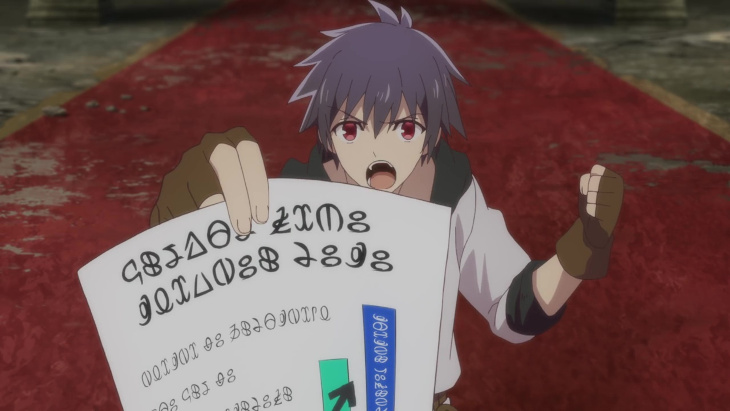
I’m Quitting Heroing takes home the dubious award of “Best Effort to Not Suck.” When one decides to follow a work for which they had a lukewarm reaction to the opening entry, they accept the risk that whatever elements they found irritating or distasteful in that initial installment may cause the work to become less and less tolerable. Those elements don’t even need to escalate to wear on one’s patience, as I doubt that Last Dungeon Boonies’ final episodes were genuinely worse than the opening ones, but the fatigue from watching an uninspired story builds the more you watch. Early on, I suspected I’d dislike I’m Quitting Heroing by the time it concluded. The show follows Leo Demonhart, a hero who has defended the planet from a demon invasion, but finds himself shunned by humanity due to his unprecedented power. In response he endeavors to join the Demon Army led by Queen Echidna which has been left in a scattered and decimated state following their defeat at Leo’s hands. She is not keen on accepting his aid, however, which forces him to covertly work alongside her generals to fix up the army and gain their trust. The series is split between Reincarnated as a Slime-style fantasy organization management comedy in the first half, and exploration of Leo’s character in the second. Of these two aspects, the latter is more interesting and relies less on mediocre comedy, though the drama and intrigue isn’t enough to fill 6 episodes. As a result, the last 3 episodes become a masterclass in how not to manage time, with a considerable percentage of that juncture devoted to a drawn out fight complete with inner monologues, flashbacks and arguing between characters. It doesn’t drag as much as the early episodes, but the show doesn’t end at its best either.
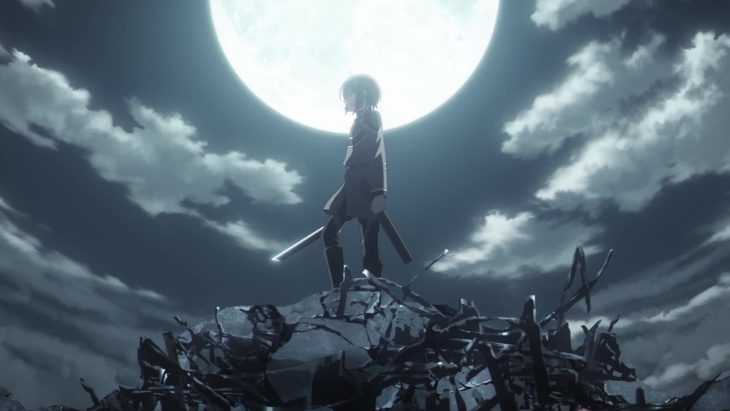
Given the clear divide between the first half and the second, it’s a bit difficult to discuss the show without analyzing the merits of a reveal that occurs at the midpoint, so consider this a spoiler warning for episode 6. I don’t believe knowing about this twist will detract from anyone’s viewing experience should they choose to watch it, but the warning is there regardless. The quality of the early episodes was rocky, to say the least. By episode 3, I was openly regretting my decision to follow the show, as that episode centered around my least favorite of the generals, Lily, who looks and acts like a child but has declared she will marry Leo (She never gets less grating. The show just focused less time on her). Most of the episodes involved Leo Kirito-ing away people’s problems with his interpersonal skills and insane power level. However, episode 6 revealed a twist that I legitimately didn’t see coming. The show was Adventure Time all along; come on, grab your friends! That’s right, this series is a magical post-apocalypse where Leo is a bioweapon designed by modern-era humans to fend off the demonic hordes that were invading. This proves to be a much more meaty story to delve into than the “Leo is told about an issue in the management of the demon army and fixes it by teaching a general about the power of friendship,” story beat that’d been repeated through the first half. Again, I should add that, even with this recontextualization, the series isn’t competent enough to fully capitalize upon it, but it does reinvigorate a show that likely would have been a slog to get through if it had remained on the course it was following.
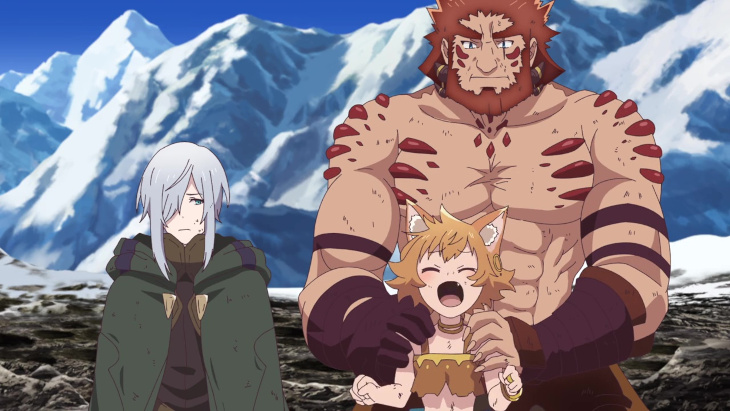
The production was handled by EMT Squared. They deliver what might be the gold standard of “passable” animation. Can passable have a gold standard? What would that be? Nickel standard? Cubic zirconia? Anyway, the point is that this is a thoroughly unremarkable production as far as the visuals are concerned. There was a single moment in the penultimate episode where I thought to myself, “This looks pretty good,” and every other scene in the show looked like it could be taken from any mediocre fantasy light novel adaptation. Light novel adaptations have this strange balance where all of their major characters somehow look both over-designed and painfully bland at the same time. It seems like those two qualities should be mutually exclusive, but clearly not. The comedy continues to be rough and tired. The best gags were probably the two I gave mild compliments to in my First Impressions review. They weren’t spectacular, but they landed better than most. The show comes closest to being genuinely good when it’s willing to devote itself to drama and plot. In that regard, this plays like an inverse of Last Dungeon Boonies in that it only works when it’s not trying to be funny.
Before I wrap up, a few Notes and Nitpicks:
- There was a moment at the beginning of episode 6 where we are shown demons attacking modern Tokyo, and I exclaimed, “Wait! Am I watching an isekai?!” I am so thankful that didn’t turn out to be the case. The twist they went with may not be the most original, but it’s better than rehashing the same ideas as every other light novel out there.
- I hate Lily. She is extremely annoying. She is too silly and loud to be taken seriously, and yet the show tries to use her in its drama, because a little girl crying adds pathos to a scene. I’d rather listen to a fire alarm.
- The rest of the generals fit into archetypes as well, but at least those archetypes don’t have the skeevy quality of “immature little girl who is romantically interested in the lead.”
- In my First Impressions review, I complained that, because “heroing” isn’t a word in the English language, my spellcheck was throwing a fit and kept suggesting it be switched to “I’m Quitting Heroin”. It turns out the texting app I use for chatting with Birdy has similar but different issues with the title as it autocorrected to “I’m Quitting Jerking”. It’s not often that I feel mocked by my spellcheck.
- One notably positive aspect that I’ll note about this series is that it features a proper ending even if components of the ending seemed to be pulled straight out of its rear. The light novel only ran for a year, so there wasn’t exactly a lot to adapt. I’m not saying they couldn’t make a sequel, but there is no sense that this story isn’t finished. Also, if they make a sequel, I’m not watching it.

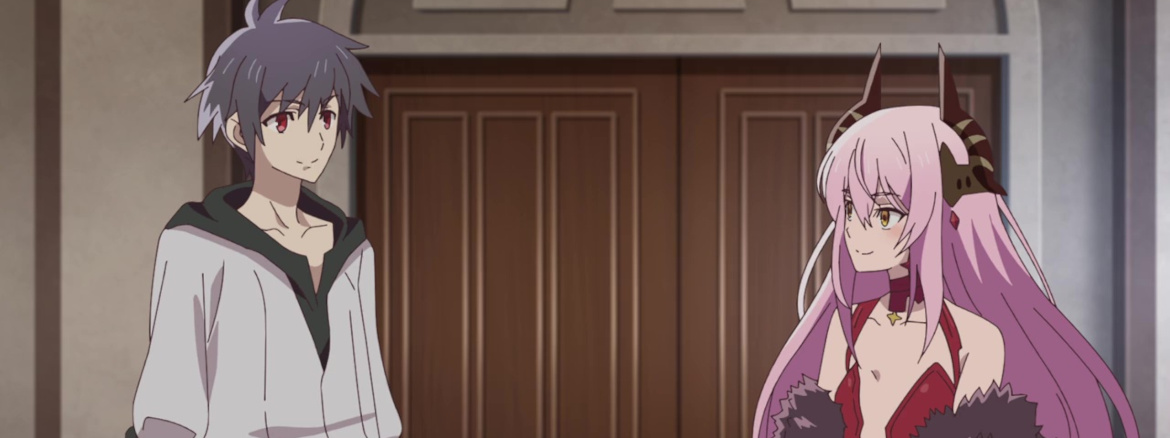


Add comment